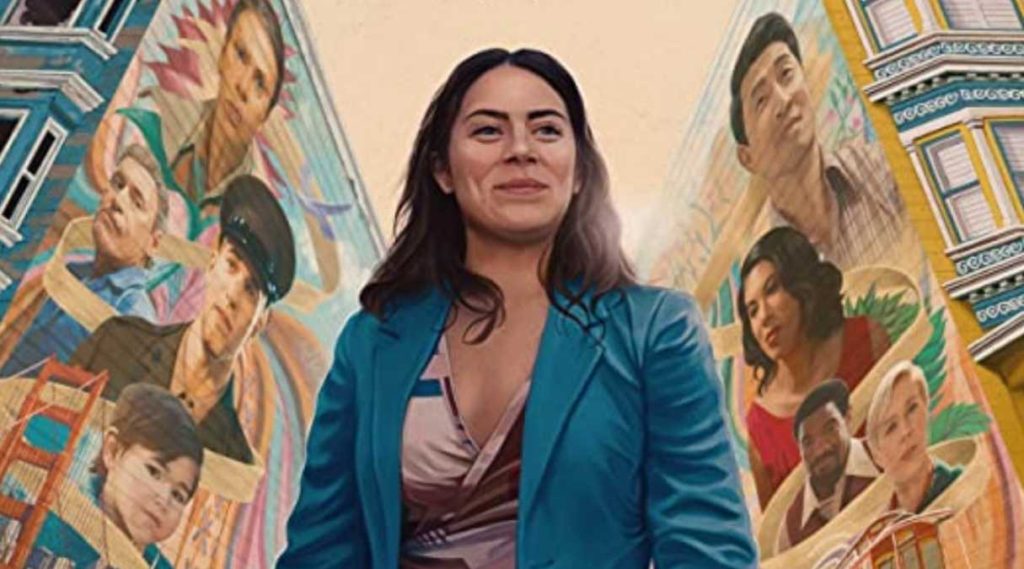
Written and directed by Lissette Feliciano, Women is Losers was the first film I watched for the 2021 SXSW Film Festival. And damn, it was a good one to pick. The film stars Lorenza Izzo, Bryan Craig, Chrissie Fit, Simu Liu, Liza Weil, Cranston Johnson, Alejandra Miranda, and Shalim Ortiz.
Set in 1960’s San Francisco, a once-promising catholic school girl, Celina Guerrera (Lorenza Izzo), sets out to rise above the oppression of poverty and invest in a future for herself and her son that sets new precedents for the time. When I registered for the film, I expected a “ra-ra” fight the system film that showed trauma but skated on its surface. But that’s not Women is Losers.
Instead, Feliciano uses comedy, the kind that marginalized folks often use to cope with systemic issues, as an element that taps the audience on the shoulder to pull them in deeper. One thing about films focused on a character overcoming struggle is that we often see them as someone else. We detach ourselves and say “good for them,” but it all feels personal with this film.
The opening of the film calls out its point; women keep losing. More specifically, women like Celina. The film brings us through her life from high school to adulthood, highlighting her mistakes and successes and how both mean nothing when the cards are continually stacked against you. Before we begin the story, Celina looks at the camera and asks the audience: “How do you pull yourself by your bootstraps when all you have left is skin?”
Celina is every single mother who was denied a loan. She is every high school dropout whose need to work to succeed and progress is stopped because of requirements that want a degree and don’t care about experience. She’s every Latina stuck in her sense of filial duty, unable to push back. She’s every young Catholic girl denied contraception because it’s her responsibility to not be a “whore.” Celina is the women I’ve known all my life. She’s my mom, my tias, and me.
Women is Losers tackles a lot in its runtime. It highlights access to abortion; what happens when it’s not safe. It tackles familial abuse and the cycles of machismo that are hard to pull out of. But most importantly, the film shows Celina overcoming all the bad that has happened to her by adapting and learning. And just as importantly, Celina isn’t shown magically overcoming things because she toughed it all out. In fact, we get to see Celina survive and thrive, only to see that you can do everything right and still lose.
It’s what we do in that loss and how we keep pushing that makes us who we are. With Celina, we see that, and we get a narrative that doesn’t showcase stoic strength and never being deterred. Instead, Celina brings anger, vulnerability, pervasive sadness, and hope. In truth, that’s what makes Women is Losers such a phenomenal film.
That said, there is hope in the film, and it comes in the form of other people, even if they bring with them small doses of tragedy. The supporting cast all have moments of greatness when acting, but none more so than Chrissie Fit and Simu Liu.
As Marty, Fit is a confidant, hopeful young girl moved by the future. She’s Celina’s best friend and, for all intents and purposes, her sister. But the world fails both of them, and when it does, Fit’s performance is heartbreakingly well-executed.
Then there is Gilbert, played by Liu, who is Celina’s boss. No stranger to discrimination, Gilbert offers Celina a hand up. He teaches her the things that no one else did. He teaches her about investments and how to save in a way that isn’t just for the next rent check. He offers her a hand up, and the two grow close. While Gilbert is far from Prince Charming, he brings a different perspective to Celina’s life, and by having his character not be white, the film escapes the white-savior trope with ease.
As she learns, the audience is reminded of a line Celina says earlier in the film, “did I make a bad decision or was I not given the knowledge to make a good one?” In that one montage of saving and learning about how to grow wealth, not just mattress money, I was reminded that no one in my family has a retirement plan. I didn’t learn about stocks, 401(k)s, or Roth IRAs from my parents. I had to learn it on my own and behind the curve of people who were taught in their youth.
When you take a step back and look at Women is Losers, there is a lot going on. It’s a whole lifetime of decisions and learning. There is trauma, there is survival, and more importantly, growth. In each act of the film, we’re given takeaways that, while fit in with the Latina experience, can be felt universally by poor women. You can do everything right, and things can still be pushed into failure by oppressive people and systems. But it’s about finding another path. While Women is Losers is a period piece, it’s still extremely relevant now.
The lessons it teaches on bodily autonomy and the freedom that contraceptives give are still especially important. Its lessons on wealth and saving ring true. And finally, the film also drives home that you aren’t beholden to your family. You can leave toxic situations to better yourself. You can choose to cut out those who harm you, and that isn’t a bad thing; it’s self-care. In fact, sometimes you need to. Women is Losers is a period piece that still carries weight when viewed through a 2021 lens.
Women is Losers isn’t perfect, but it does strike a chord in my very core. Celina is my mom. Celina is all the women who came before me. And even in the film’s slightly rushed ending, we see that resiliency and growth, even when hard-won, are possible, even when it feels like we’re drowning.
Women is Losers was screened at SXSW 2021 and is available now on HBO Max.
Women is Losers
-
Rating - 8/108/10
TL;DR
Women is Losers isn’t perfect, but it does strike a chord in my very core. Celina is my mom. Celina is all the women who came before me. And even in the film’s slightly rushed ending, we see that resiliency and growth, even when hard-won, are possible, even when it feels like we’re drowning.







